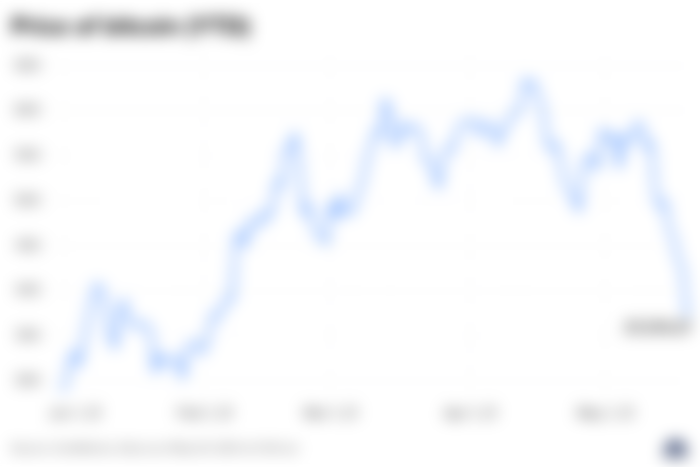When people talk about volatility, they usually will associate it with risk. Particularly when people discuss Bitcoin, the first thing that comes to their mind is that it is risky.
Why is Bitcoin so volatile and what makes it so volatile? But before we discuss Bitcoin, we want to know what really is volatility?
What is volatility?
The book definition is a measurement of the rate of fluctuation in the price of a security over time. People usually mistakenly believe that it can predict the future of price movements. It is incorrect. Think about physics that volatility is an acceleration of the speed as the price. It tells you how fast speed (or price) can move positively or negatively.
Security moves up or down because its price is mismatched with its valuation.
As you may know, price is what the seller offered and valuation is what buyer wanted to pay for.
From a buyer's perspective (or investor like you), price is objective and valuation is subjective.
Wider range of mispricing is caused by lack of information.
Information matters!
There is always a gap of information. Whether it depends on daily news or some internal change of the purpose of security.
In early May of 2018, Berkshire’s Charlie Munger called out that Bitcoin is worthless and artificial gold.
Investors were speculating about Bitcoin in a wider range from worthless to nowadays a great investment vehicle to ride with volatility according to CNBC.
The wide range of information gaps created a wide range of valuation from $0 to $100,000.
In my opinion, both cases are equally likely.
Types of Volatility:
Two types of volatility: historical and implied volatility.
Historical volatility is measurements of the past fluctuations to use to predict the future volatility. It works only if the security exists for a long period of time, stocks and gold.
Implied volatilityis offering an option equal to current market price such as option trading that you can bet on to call for price rise in the future or put for price decline in the future.

Bitcoin has short historical volatility as investors may constantly bring up the past when it crashed more than 50%.
Bitcoin also has implied volatility because holders hope it will rise and shine. It did outperform any asset classes during April 2021.
What really made Bitcoin so Volatile?
Intrinsic value:

Investors usually will bring the topic of intrinsic value of Bitcoin or argue that Bitcoin did not have it. Unlike stocks issued from the company, its intrinsic value depends on its discounted cash flow or whether companies will continue generating cash to pay off debts, and their investors while operating as usual. Bitcoin is not a company. Thus, it does not have intrinsic value.
In my opinion, Bitcoin, just like Gold, is a speculated asset. Unlike Gold which is valuable as itself (if you believe it), Bitcoin requires efforts to mine and produce through a mining process which causes energy. IN early days, Bitcoin could be mined from an individual with a laptop to generate profits. Nowadays, it is unlikely that companies that generate large amounts of power to mine Bitcoin. Bitcoin mining companies just like gold miners’ companies are generating profits to compete in the market. It created a fundamental value of Bitcoin.
Institutional investors lack of information about Bitcoin:
Institutional investors are conservative about their risks which either preserve value or increase valuation. Also, Bitcoin was associated with scams and criminals that make them nerve racking.
They saw Bitcoin volatility as a threat and Bitcoin’s narrative was becoming a digital cash back then. Internet business was not a mainly driven force of innovation.
Thanks to big tech and COVID-19 induced financial crisis, Bitcoin’s narrative shifted from digital cash to digital gold to store value and the internet became the norm for people to conduct their business.
Under such an environment, Bitcoin’s volatility becomes an opportunity for everyone to take.
Problem of Bitcoin’s volatility creates an opportunity:
Winder fluctuations of price may scare off many investors. When you see your asset suddenly cut by half the next day, it makes you anxious.
However, it is a part of Bitcoin’s character because it is a living technology. Its characters will change along with the environment. Its valuation will always mismatch with prices similar to stock markets, since companies' cash flow forecasts may not as accurately reflect what analysts predict.
Volatility of Bitcoin is an opportunity for investors to enter their position which makes Bitcoin more accessible unlike stock with high price to become inaccessible for younger investors.
In conclusion:
Volatility is accelerated to a price which cannot predict the future. Bitcoin’s volatility creates opportunity for new investors to enter the market. Its volatility will continue to spread widely because of mispricing but you should not worry about it.


I suppose at the end of the day, one's ultimate investment into the coin depends on where they see the coin going in the future. If one examines it and thinks it could one day be worth $100,000 or more per coin, then the current price would suggest it would be a good thing to invest in.
I wish I knew more about how the value is ultimately determined. Like you said, Bitcoin is not a company and there is little to measure the value. So it IS speculation, as you suggest.
I am glad you were able to easily describe volatility as well, because a lot of people see volatility as a constant negative, when it can also be good. If the underlying asset is good, large price swings can be a very welcome thing for investors because it offers greater opportunities to profit from the dips.